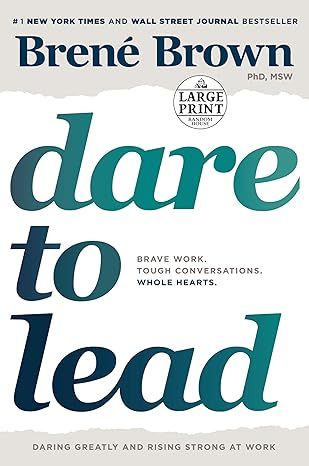Dare to Lead: Brave Work. Tough Conversations. Whole Hearts.Audiobook
4.7
-
21,212 ratings
#1 NEW YORK TIMES **BESTSELLER • Brené Brown has taught us what it means to dare greatly, rise strong, and brave the wilderness. Now, based on new research conducted with leaders, change makers, and culture shifters, she’s showing us how to put those ideas into practice so we can step up and lead.
Don’t miss the five-part Max docuseries** Brené Brown: Atlas of the Heart **!
ONE OF** BLOOMBERG ’S BEST BOOKS OF THE YEAR
Leadership is not about titles, status, and wielding power. A leader is anyone who takes responsibility for recognizing the potential in people and ideas, and has the courage to develop that potential.
When we dare to lead, we don’t pretend to have the right answers; we stay curious and ask the right questions. We don’t see power as finite and hoard it; we know that power becomes infinite when we share it with others. We don’t avoid difficult conversations and situations; we lean into vulnerability when it’s necessary to do good work.
But daring leadership in a culture defined by scarcity, fear, and uncertainty requires skill-building around traits that are deeply and uniquely human. The irony is that we’re choosing not to invest in developing the hearts and minds of leaders at the exact same time as we’re scrambling to figure out what we have to offer that machines and AI can’t do better and faster. What can we do better? Empathy, connection, and courage, to start.
Four-time #1 New York Times bestselling author Brené Brown has spent the past two decades studying the emotions and experiences that give meaning to our lives, and the past seven years working with transformative leaders and teams spanning the globe. She found that leaders in organizations ranging from small entrepreneurial startups and family-owned businesses to nonprofits, civic organizations, and Fortune 50 companies all ask the same question:
How do you cultivate braver, more daring leaders, and how do you embed the value of courage in your culture?
In Dare to Lead, Brown uses research, stories, and examples to answer these questions in the no-BSstyle that millions of readers have come to expect and love.
Brown writes, “One of the most important findings of my career is that daring leadership is a collection of four skill sets that are 100 percent teachable, observable, and measurable. It’s learning and unlearning that requires brave work, tough conversations, and showing up with your whole heart. Easy? No. Because choosing courage over comfort is not always our default. Worth it? Always. We want to be brave with our lives and our work. It’s why we’re here.”
Whether you’ve read Daring Greatly and Rising Strong or you’re new to Brené Brown’s work, this book is for anyone who wants to step up and into brave leadership.
Read more
Kindle
$13.99
Available instantly
Audiobook
$0.99
with membership trial
Hardcover
$15.17
Paperback
$16.59
Ships from
Amazon.com
Payment
Secure transaction
ISBN-10
0593171128
ISBN-13
978-0593171127
Print length
400 pages
Language
English
Publisher
Random House Large Print
Publication date
July 22, 2019
Dimensions
6.05 x 1.05 x 9.2 inches
Item weight
2.31 pounds
Popular Highlights in this book
Vulnerability is not winning or losing. It’s having the courage to show up when you can’t control the outcome.
Highlighted by 19,187 Kindle readers
I define a leader as anyone who takes responsibility for finding the potential in people and processes, and who has the courage to develop that potential.
Highlighted by 17,665 Kindle readers
The courage to be vulnerable is not about winning or losing, it’s about the courage to show up when you can’t predict or control the outcome.
Highlighted by 13,642 Kindle readers
We avoid tough conversations, including giving honest, productive feedback.
Highlighted by 13,440 Kindle readers
Daring leaders must care for and be connected to the people they lead.
Highlighted by 12,143 Kindle readers
Product details
ASIN :
B07CWGFPS7
File size :
7961 KB
Text-to-speech :
Enabled
Screen reader :
Supported
Enhanced typesetting :
Enabled
X-Ray :
Enabled
Word wise :
Enabled
Editorial reviews
Review
“With Dare to Lead, Brené brings decades of research to bear in a practical and insightful guide to courageous leadership. This book is a road map for anyone who wants to lead mindfully, live bravely, and dare to lead.”—Sheryl Sandberg, COO, Facebook, founder, LeanIn.Org and OptionB.Org
“Brené visited Pixar to talk with our filmmakers. Her message was important, as movies are best when they come from a place of vulnerability, when the people who make them encounter setbacks and are forced to overcome them, when they are willing to have their asses handed to them. It is easy to sit back and talk about the values of a safe and meaningful culture, but extraordinarily difficult to pull it off. You don’t achieve good culture without constant attention, without an environment of safety, courage, and vulnerability. These are hard skills, but they are teachable skills. Start with this book.”—Ed Catmull, president, Pixar and Walt Disney Animation Studios
“Whether you’re leading a movement or a start-up, if you’re trying to change an organizational culture or the world, Dare to Lead will challenge everything you think you know about brave leadership and give you honest, straightforward, actionable tools for choosing courage over comfort.”—Tarana Burke, senior director, Girls for Gender Equity, founder, theMe Too movement
“We asked Brené to bring her work on courage and vulnerability to our Air Force base. This is a tough audience, many of them with significant combat experience. Within five minutes, you could have heard a pin drop. Brené cuts through the noise and speaks to what makes us human and makes the mission happen. Dare to Lead is about real leadership: tenacious, from the heart, and full of grit.”—Brigadier General Brook J. Leonard, United States Air Force
“Brené is Google Empathy Lab’s Obi-Wan Kenobi. She has profoundly inspired our product leaders to designin and embrace vulnerability, rather than engineer it out. It’s a critical and transformative act to bring your alive, messy, wholehearted human self to work every day. Dare to Lead is the skillful and empowering Jedi training we have all been waiting for.”—Danielle Krettek, founder, Google Empathy Lab
“Applying the principles from Dare to Lead to my work as a principal has transformed the way I show up with parents, students, and colleagues, and how I lead. Brené’s words, stories, and examples connect with our hearts and minds, and her actionable approach gives us the tools to be braver with our lives and our work.”—Kwabena Mensah, PhD, assistant superintendent, Fort Bend ISD, Principal of the Year, Katy ISD and Texas Alliance of Black School Educators
“Brené truly gives it all away in Dare to Lead. Courage is a set of teachable skills, and she teaches us exactly how to build those muscles with research, stories, examples, and new language. The future belongs to brave leaders, and she’s written the ultimate playbook for daring leadership.”—Scott Harrison, founder and CEO, charity: water
About the Author
Dr. Brené Brown is a research professor at the University of Houston, where she holds the Huffington Foundation Endowed Chair at the Graduate College of Social Work. She also holds the position of visiting professor in management at the University of Texas at Austin McCombs School of Business. Brené has spent the past two decades studying courage, vulnerability, shame, and empathy. She is the author of six #1 New York Times bestsellers and is the host of two award-winning podcasts, Unlocking Us and Dare to Lead. Brené’s books have been translated into more than 30 languages, and her titles include Atlas of the Heart, Dare to Lead, Braving the Wilderness, Rising Strong, Daring Greatly, and The Gifts of Imperfection. With Tarana Burke, she co-edited the bestselling anthology You Are Your Best Thing: Vulnerability, Shame Resilience, and the Black Experience. Brené’s TED talk on the Power of Vulnerability is one of the top five most-viewed TED talks in the world, with over 60 million views. Brené is the first researcher to have a filmed lecture on Netflix, and in March 2022, she launched a new show on HBO Max that focuses on her latest book, Atlas of the Heart. Brené spends most of her time working in organizations around the world, helping develop braver leaders and more courageous cultures. She lives in Houston, Texas, with her husband, Steve. They have two children, Ellen and Charlie, and a weird Bichon named Lucy.
Read more
Sample
Excerpt. © Reprinted by permission. All rights reserved.
The Moment and the Myths
the moment the universe put the Roosevelt quote in front of me, three lessons came into sharp focus. The first one is what I call “the physics of vulnerability.” It’s pretty simple: If we are brave enough often enough, we will fall. Daring is not saying “I’m willing to risk failure.” Daring is saying “I know I will eventually fail, and I’m still all in.” I’ve never met a brave person who hasn’t known disappointment, failure, even heartbreak.
Second, the Roosevelt quote captures everything I’ve learned about vulnerability. The definition of vulnerability as the emotion that we experience during times of uncertainty, risk, and emotional exposure first emerged in my work two decades ago, and has been validated by every study I’ve done since, including this research on leadership. Vulnerability is not winning or losing. It’s having the courage to show up when you can’t control the outcome.
We’ve asked thousands of people to describe vulnerability to us over the years, and these are a few of the answers that directly pierce the emotion: the first date after my divorce, talking about race with my team, trying to get pregnant after my second miscarriage, starting my own business, watching my child leave for college, apologizing to a colleague about how I spoke to him in a meeting, sending my son to orchestra practice knowing how badly he wants to make first chair and knowing there’s a really good chance he will not make the orchestra at all, waiting for the doctor to call back, giving feedback, getting feedback, getting fired, firing someone.
Across all of our data there’s not a shred of empirical evidence that vulnerability is weakness.
Are vulnerable experiences easy? No.
Can they make us feel anxious and uncertain? Yes.
Do they make us want to self-protect? Always.
Does showing up for these experiences with a whole heart and no armor require courage? Absolutely.
The third thing I learned has turned into a mandate by which I live: If you are not in the arena getting your ass kicked on occasion, I’m not interested in or open to your feedback. There are a million cheap seats in the world today filled with people who will never be brave with their lives but who will spend every ounce of energy they have hurling advice and judgment at those who dare greatly. Their only contributions are criticism, cynicism, and fearmongering. If you’re criticizing from a place where you’re not also putting yourself on the line, I’m not interested in what you have to say.
We have to avoid the cheap-seats feedback and stay armor-free. The research participants who do both of those well have one hack in common: Get clear on whose opinions of you matter.
We need to seek feedback from those people. And even if it’s really hard to hear, we must bring it in and hold it until we learn from it. This is what the research taught me:
Don’t grab hurtful comments and pull them close to you by rereading them and ruminating on them. Don’t play with them by rehearsing your badass comeback. And whatever you do, don’t pull hatefulness close to your heart.
Let what’s unproductive and hurtful drop at the feet of your unarmored self. And no matter how much your self-doubt wants to scoop up the criticism and snuggle with the negativity so it can confirm its worst fears, or how eager the shame gremlins are to use the hurt to fortify your armor, take a deep breath and find the strength to leave what’s mean-spirited on the ground. You don’t even need to stomp it or kick it away. Cruelty is cheap, easy, and chickenshit. It doesn’t deserve your energy or engagement. Just step over the comments and keep daring, always remembering that armor is too heavy a price to pay to engage with cheap-seat feedback.
Again, if we shield ourselves from all feedback, we stop growing. If we engage with all feedback, regardless of the quality and intention, it hurts too much, and we will ultimately armor up by pretending it doesn’t hurt, or, worse yet, we’ll disconnect from vulnerability and emotion so fully that we stop feeling hurt. When we get to the place that the armor is so thick that we no longer feel anything, we experience a real death. We’ve paid for self-protection by sealing off our heart from everyone, and from everything—not just hurt, but love.
No one captures the consequences of choosing that level of self-protection over love better than C. S. Lewis:
To love at all is to be vulnerable. Love anything, and your heart will certainly be wrung and possibly be broken. If you want to make sure of keeping it intact, you must give your heart to no one, not even to an animal. Wrap it carefully round with hobbies and little luxuries; avoid all entanglements; lock it up safe in the casket or coffin of your selfishness. But in that casket—safe, dark, motionless, airless—it will change. It will not be broken; it will become unbreakable, impenetrable, irredeemable.
To love is to be vulnerable.
Rumble Tool: The Square Squad
When we define ourselves by what everyone thinks, it’s hard to be brave. When we stop caring about what anyone thinks, we’re too armored for authentic connection. So how do we get clear on whose opinions of us matter?
Here’s the solution we shared in Daring Greatly: Get a one-inch by one-inch piece of paper and write down the names of the people whose opinions of you matter. It needs to be small because it forces you to edit. Fold it and put it in your wallet. Then take ten minutes to reach out to those people—your square squad—and share a little gratitude. You can keep it simple: I’m getting clear on whose opinions matter to me. Thank you for being one of those people. I’m grateful that you care enough to be honest and real with me.
If you need a rubric for choosing the people, here’s the best I have: The people on your list should be the people who love you not despite your vulnerability and imperfections, but because of them.
The people on your list should not be “yes” people. This is not the suck-up squad. They should be people who respect you enough to rumble with the vulnerability of saying “I think you were out of your integrity in that situation, and you need to clean it up and apologize. I’ll be here to support you through that.” Or “Yes, that was a huge setback, but you were brave and I’ll dust you off and cheer you on when you go back into the arena.”
The Four Six Myths of Vulnerability
In Daring Greatly, I wrote about four myths surrounding vulnerability, but since I’ve brought the courage-building work into organizations and have been doing it with leaders, the data have spoken, and there are clearly six misguided myths that persist across wide variables including gender, age, race, country, ability and culture.
Myth #1: Vulnerability is weakness.
It used to take me a long time to dispel the myths that surround vulnerability, especially the myth that vulnerability is weakness. But in 2014, standing across from several hundred military special forces soldiers on a base in the Midwest, I decided to stop evangelizing, and I nailed my argument with a single question.
I looked at these brave soldiers and said, “Vulnerability is the emotion that we experience during times of uncertainty, risk, and emotional exposure. Can you give me a single example of courage that you’ve witnessed in another soldier or experienced in your own life that did not require experiencing vulnerability?”
Complete silence. Crickets.
Finally, a young man spoke up. He said, “No, ma’am. Three tours. I can’t think of a single act of courage that doesn’t require managing massive vulnerability.”
I’ve asked that question now a couple of hundred times in meeting rooms across the globe. I’ve asked fighter pilots and software engineers, teachers and accountants, CIA agents and CEOs, clergy and professional athletes, artists and activists, and not one person has been able to give me an example of courage without vulnerability. The weakness myth simply crumbles under the weight of the data and people’s lived experiences of courage.
Read more
About the authors
Brené Brown
Dr. Brené Brown is a research professor at the University of Houston, where she holds the Huffington Foundation Endowed Chair at the Graduate College of Social Work. She also holds the position of visiting professor in management at the University of Texas at Austin McCombs School of Business.
Brené has spent the past two decades studying courage, vulnerability, shame, and empathy. She is the author of six #1 New York Times best sellers and is the host of two award-winning Spotify podcasts, Unlocking Us and Dare to Lead.
Brené’s books have been translated into more than 30 languages, and her titles include Atlas of the Heart, Dare to Lead, Braving the Wilderness, Rising Strong, Daring Greatly, and The Gifts of Imperfection. With Tarana Burke, she co-edited the best-selling anthology You Are Your Best Thing: Vulnerability, Shame Resilience, and the Black Experience.
Brené’s TED talk on the Power of Vulnerability is one of the top five most-viewed TED talks in the world, with over 50 million views. Brené is the first researcher to have a filmed lecture on Netflix, and in March 2022, she launched a new show on HBO Max that focuses on her latest book, Atlas of the Heart.
Brené spends most of her time working in organizations around the world, helping develop braver leaders and more-courageous cultures. She lives in Houston, Texas, with her husband, Steve. They have two children, Ellen and Charlie, and a weird Bichon named Lucy.
Read more
Reviews
Customer reviews
4.7 out of 5
21,212 global ratings
Shortcake BA
5
Gives great internal insight
Reviewed in the United States on September 16, 2024
Verified Purchase
This was a work requirement and if you work the process it helps you to self reflect to understand what internally you might need to work on
Michael O'S
5
Great info
Reviewed in the United States on September 4, 2024
Verified Purchase
The material she presents is backed by research. I found myself agreeing with many things she said and at the same time doing some deep reflection of my own. A very good book about leadership.
Michael O'S
5
Great info
Reviewed in the United States on September 4, 2024
Verified Purchase
The material she presents is backed by research. I found myself agreeing with many things she said and at the same time doing some deep reflection of my own. A very good book about leadership.
Marcin Gorski
5
Exceptional Guidance from Brene Brown
Reviewed in the United States on June 2, 2023
Verified Purchase
"Dare to Lead: Brave Work. Tough Conversations. Whole Hearts." by Brené Brown is an extraordinary book that delves into the realms of leadership and vulnerability. With her signature blend of research, personal anecdotes, and insightful wisdom, Brown offers a transformative guide for leaders who aspire to create courageous, inclusive, and empathetic work environments.
The book begins by debunking common misconceptions about leadership and emphasizes the importance of vulnerability. Brown challenges the traditional notion that leaders must be invulnerable and strong at all times, arguing that true leadership requires authenticity, self-awareness, and the willingness to be vulnerable. She encourages leaders to step into the arena, embrace discomfort, and cultivate a culture of psychological safety where everyone feels seen, heard, and valued.
Throughout the book, Brown explores various aspects of daring leadership, including trust, empathy, resilience, and the ability to have difficult conversations. She highlights the significance of building trust within teams, fostering genuine connections, and creating an environment where people feel safe to take risks and be themselves. Brown emphasizes the importance of empathy as a leadership skill, reminding us of the power of truly understanding and caring for others.
One of the book's strengths is its incorporation of research and data to support Brown's insights. She draws upon her own extensive research and interviews with leaders from diverse industries to provide evidence-based strategies and practices. The integration of real-life examples adds depth and authenticity to the book, making it relatable and applicable to a wide range of leadership contexts.
What sets "Dare to Lead" apart from other leadership books is its emphasis on the role of vulnerability in effective leadership. Brown skillfully explores how vulnerability can lead to greater innovation, creativity, and connection within organizations. She guides readers through exercises and practices that encourage self-reflection, helping leaders identify their own vulnerabilities and develop the courage to show up authentically in their roles.
Furthermore, the writing style of "Dare to Lead" is engaging and accessible. Brown's warmth, humor, and storytelling ability make the book an enjoyable and compelling read. She effortlessly combines personal anecdotes with research findings, making complex concepts easily understandable and relatable.
The book also provides practical tools and strategies that leaders can implement immediately. Brown offers actionable advice on building trust, navigating difficult conversations, setting boundaries, and embracing failure as a learning opportunity. Each chapter concludes with a "Put It into Practice" section, which provides actionable steps and reflective questions to guide the reader's personal growth and development as a leader.
In conclusion, "Dare to Lead: Brave Work. Tough Conversations. Whole Hearts." is an exceptional book that challenges traditional notions of leadership and inspires readers to lead with vulnerability, courage, and wholeheartedness. Brené Brown's blend of research, personal stories, and practical guidance make this book a valuable resource for leaders across industries and at all levels of experience. Whether you are a seasoned executive or aspiring leader, "Dare to Lead" will empower you to create transformative change within yourself and your organization.
Read more
20 people found this helpful
Bookwyrm
5
Not just for work! Wish I had this book years ago, it would have
Reviewed in the United States on October 9, 2018
Verified Purchase
saved me grief and kept me from causing others grief. Dare to Lead is for everyone, not just professional leaders, because everything in this book applies to families and other groups. As Brené states, “I define a leader as anyone who takes responsibility for finding the potential in people and processes, and who has the courage to develop that potential.” In fact, Dare to Lead would be a wonderful resource or curriculum for a required high school class. There is SO much incredible insight, wisdom, and advice that my brain is tired, and it’s been havoc on my tear ducts multiple times.
We all belong to groups, whether it’s at work, in social and community groups or clubs, etc., as members or leaders. And while this book is primarily aimed at leaders in the workplace, any group member would benefit from this knowledge and advice. Over the years, my groups have included my family of origin, my family from marriage, educational groups, event groups, competitive groups, etc. I have always been a good worker, boss, teacher, and leader of different groups. But “good” leaves a lot of leeway for the fact that a few times I have really screwed up in the very ways that Brené discusses. I look back and there were times that my perfectionism, my black-and-white rule-following, and my tendency to sometimes rush to judgement really hurt people. Not to mention, my shame affected my leadership.
As I read Dare to Lead, I kept flashing to situations in my past and a couple of people I would really like to go back apologize to, one lady in particular. (Well, really, I want to travel back in time and not screw up to begin with, but sadly that’s just a fantasy.) A bit of background: I was raised in a very abusive family, physically and emotionally. My family of origin’s modus operandi was to judge, criticize, and belittle each member constantly. Mistakes and weaknesses were never forgiven, but held up, mocked, and laughed about over and over, on top of physical and emotional abuse.
Armed with self-help books (yes, my family mocks my reliance on self-help books) and therapy, I determined to leave all that behind and become a “normal” person very different from my parents. But sometimes that background messes with my current life. (As Brené says: “What’s perhaps most insidious in power over dynamics is that those who are powerless typically repeat the same behavior when the tables are turned and they are promoted into power.” I would add, sometimes against our best intentions.)
There was a time that my insecurity in running a large group led me to take a friend’s reported actions as betrayal. The resulting emotional backlash caused me to handle the situation so badly that I ended up being judgmental and majorly unkind to my friend to such a degree that the title “friend” no longer applies. I should have known better; I should have acted better. It wasn’t just that I hurt my reputation, interfered with how well the group was functioning, looked unprofessional to a hosting facility… The absolutely worst part was that I hurt another person - an innocent person. I broke every tenet I had set for my life because I didn’t take the time to step back and to be a good leader; I just reacted. I went right into shame and blame because I had such an inner fear of being disrespected and betrayed. As a consequence, I disrespected and betrayed my friend by treating her unkindly.
In addition, I almost shut down a service that was helping over 1,000 families over the incident. I let fear rule my actions (“I don’t do vulnerability”) and cut my helpers loose (“I can go it alone”). I curtailed offerings and cancelled events. I had listened to and internalized comments from critics as they touched upon the worthlessness instilled by my parents and siblings. (Many people are eager to criticize, and it takes wisdom and practice to let go of unhelpful criticism and use the helpful input for growth.) My actions influenced some members to take sides in a group that shouldn’t have had “sides.” (“Increased polarization, rampant dehumanization of people who are different from us, and our growing inability to ditch the echo chambers for real critical thinking.”) After working alone for another year or so, I handed off the group to a team of ladies that I knew would do a better job than I was doing.
I believe if I had read Dare to Lead first, I would have had the tools in place to respond appropriately in a way that would have fostered group cohesion, eliminated problems, and just generally been a better leader for my group. In addition, I ponder Brené’s adage that the “courage to be vulnerable is not about winning or losing, it’s about the courage to show up when you can’t predict or control the outcome.” I’ve considered going back and apologizing to my ex-friend many times, but I’ve always been afraid that it would simply set off more negativity. But it was my lack of judgement and responding with emotions from my past that caused the rift, and I’d like her to know that I take full responsibility for that. Is it too late to go back and tell this person how badly I feel about being a leader who truly mishandled the situation? Would it make a difference to her?
I plan to reread this life-changing book with my husband and daughter, both IT professionals, so they can learn from it while I benefit from the review. Dare to Lead contains wisdom to guide leaders who want to nurture safe and effective work groups. It can also benefit leaders and members of any other groups or teams, whether for a sport, church, political group, competitive team, etc. Dare to Lead would also be a great resource for members to use to kindly hold leaders accountable. There is no downside to taking this entire book in as heart knowledge and incorporating it into our lives. And the upside is that we will not only improve the quality of our own lives, but the lives of those we interact with.
Highly recommended for the universe at large. This is the first book I’ve read by Brené Brown; I’ll definitely be reading more!
Edited for clarity.
Read more
411 people found this helpful
Top Brené Brown titles
View all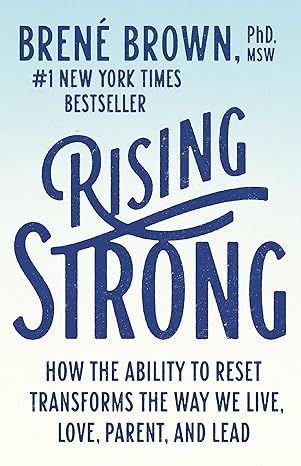
Rising Strong: How the Ability to Reset Transforms the Way We Live, Love, Parent, and Lead
4.7
-
11,216
$0.99
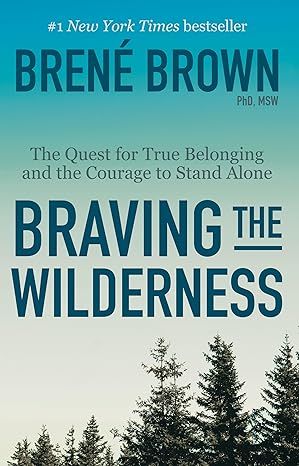
Braving the Wilderness: The Quest for True Belonging and the Courage to Stand Alone
4.6
-
14,403
$0.99
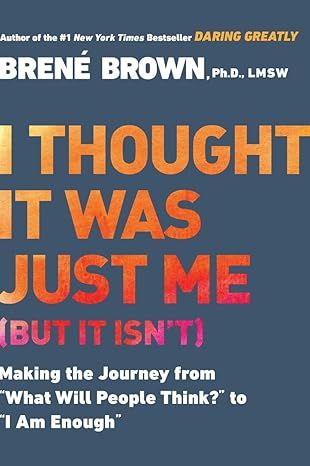
I Thought It Was Just Me (but it isn't): Making the Journey from "What Will People Think?" to "I Am Enough"
4.7
-
7,822
$0.99
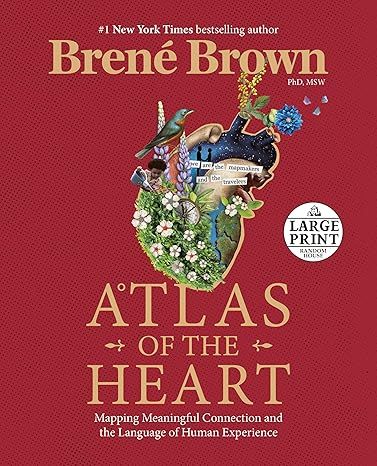
Atlas of the Heart: Mapping Meaningful Connection and the Language of Human Experience (Random House Large Print)
4.7
-
20,467
$0.99
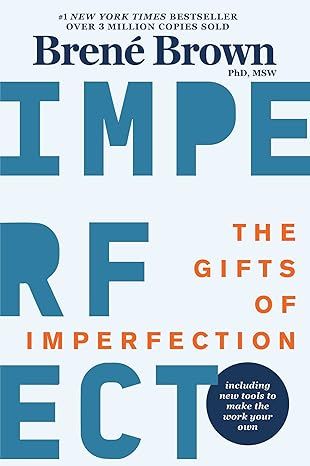
The Gifts of Imperfection: 10th Anniversary Edition: Features a new foreword and brand-new tools
4.7
-
42,318
$0.99
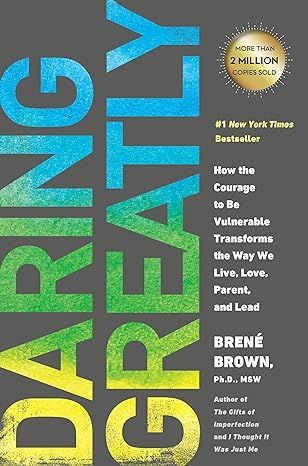
Daring Greatly: How the Courage to Be Vulnerable Transforms the Way We Live, Love, Parent, and Lead
4.7
-
30,025
$4.43
Best Sellers
View all
The Tuscan Child
4.2
-
100,022
$8.39

The Thursday Murder Club: A Novel (A Thursday Murder Club Mystery)
4.3
-
155,575
$6.33

Sapiens: A Brief History of Humankind
4.6
-
140,302
$13.49

The Butterfly Garden (The Collector, 1)
4.3
-
88,556
$9.59

Things We Hide from the Light (Knockemout Series, 2)
4.4
-
94,890
$11.66

The Last Thing He Told Me: A Novel
4.3
-
154,085
$2.99

The Perfect Marriage: A Completely Gripping Psychological Suspense
4.3
-
143,196
$9.47

The Coworker
4.1
-
80,003
$13.48

First Lie Wins: A Novel (Random House Large Print)
4.3
-
54,062
$14.99

Mile High (Windy City Series Book 1)
4.4
-
59,745
$16.19

Layla
4.2
-
107,613
$8.99

The Locked Door
4.4
-
94,673
$8.53
